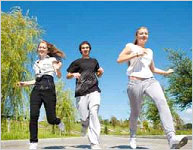

Common running mistakes
- Read on to check whether you’re guilty of making these errors
 23 Jul 2013: Running is one of the best exercises one can do, as it provides a good cardio workout. It also has other benefits such as aiding in weight loss, toning the legs, relieving stress, etc. People who don’t like working out indoors within the confines of a gym swear by running outdoors. However, make sure that you don’t commit these common mistakes:
23 Jul 2013: Running is one of the best exercises one can do, as it provides a good cardio workout. It also has other benefits such as aiding in weight loss, toning the legs, relieving stress, etc. People who don’t like working out indoors within the confines of a gym swear by running outdoors. However, make sure that you don’t commit these common mistakes:
No warm-up or stretching
We know it’s not easy to take out time for running from your busy schedule. But if you’re dedicated to doing so, then run right on all counts. One of the most common running mistakes is insufficient, or worse, no stretching before running. Doing warm-ups and stretching before running prevents soreness in the muscles and reduces the risk of injuries like muscle pulls, shin splints and plantar fasciitis.
Note: First do warm-up and then do stretching.
Wrong footwear
It is a known fact that many runners over run the life of their shoes and this could lead to major injuries like Achilles Tendonitis. The problem is that these injuries take time to develop and take even longer to heal. Hence, a runner would not be able to do his/her training due to a small mistake like wearing worn-out shoes. Fitness expert Samir Purohit advises, "Runners should buy new shoes for approximately every 200 km they cover, as the loss of cushioning would lead to injuries. Also, a good idea would be to buy a new pair of shoes half way through the life of your old shoes. Buying the right shoes for running can sometimes be pretty daunting as the right shoe really depends on your style of running ie. your foot type eg. Flat feet/Over pronator/Under Pronator." One of the most important aspects while buying the shoe is the correct size. One should always buy shoes that are half a size bigger because your feet will swell while running. There are a few shops in Mumbai that offer a foot analysis, which you should go through prior to buying the shoe.
Running too fast, too soon
Most beginners get over enthusiastic about running that they do the common mistake of running too fast, too soon. This not only saps them out of energy but also makes them prone to running injuries like shin splints and runner’s knee. The ideal way is to begin walking and then gradually proceed to running. Remember to increase your mileage gradually, preferably on a weekly basis.
Striking the heels
Recently, barefoot running (dangerous on Mumbai roads!) and running with minimalist footwear (the ones that replicate barefoot running minus the dangers) are gaining popularity because they minimise striking the heels on the ground. Pilates trainer Namrata Purohit says, "Running is something anybody can do. All you need to do is put on your shoes, get out and run. Therefore, the technique of running is commonly ignored. If you try running barefoot, the tendency is to run on your toes which is more natural than when we put our shoes on and tend to land heel first. Landing on the heel can cause knee problems, shin splints, lower back pain, Achilles Tendonitis, etc."
Insufficient hydration
Don’t be under the false impression that only running in the sun causes dehydration. Runners should be aware that running in cold weather also causes dehydration as more often than not, the runner is normally well-layered in clothes to keep his/herself warm.
"Water is very important for runners as it helps cool the body, acts as a lubricant for muscles and joints, and is a medium for all metabolic activity in our body. Even a 1% dehydration would lead to a 5% drop in metabolic efficiency, which would lead to premature muscle fatigue," warns Samir and advises to drink approximately 8 ounces (around 250 ml/ 1cup) of water about 30 minutes before running. Also, when one is running, aim for approximately 8 ounces of water for every 15 minutes of running, and 8 ounces or so after 30 minutes of running.
No cross-training
In this case, cross-training essentially means doing exercises other than running, which could include going to the gym, doing pilates, etc. "Cross-training is extremely important as it helps strengthen the muscles necessary for running and other muscles that support them. Overall, body strength and flexibility is important for runners and others, too. Core strength is also needed in order to run well and cover that extra distance. Practising other forms of exercise helps strengthen weaker areas of the body. It also helps prevent injury," opines Namrata.